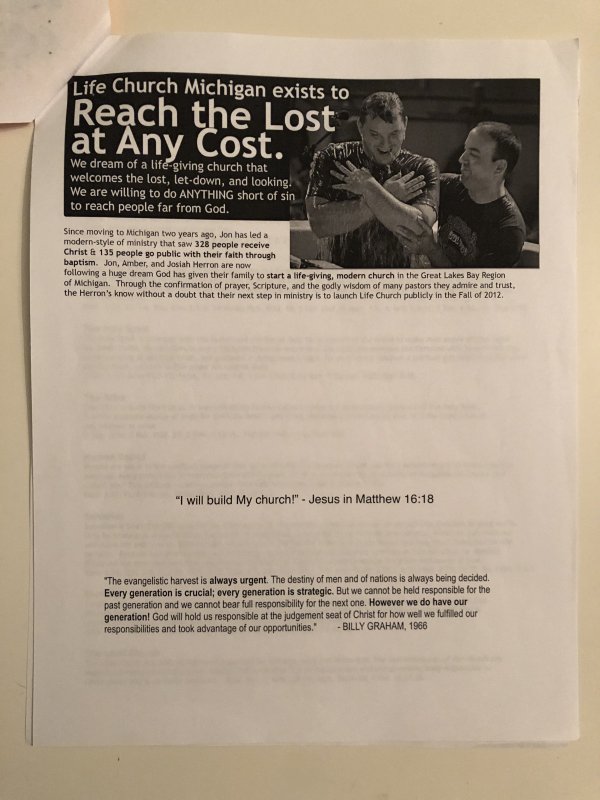Church leaders are seeking fresh ways to prevent "backdoor exits" and adapt to shifting membership.
---
by Maria Baer
---
The membership packet for new congregants at Cross City Church in Columbus, Ohio, is pretty straightforward. There’s a section enumerating the church’s “essential doctrines,” including creedal beliefs like the Trinity and the saving work of Jesus on the cross. There’s a section about church leadership and discipline, explaining the church’s process when a member sins.
And there’s a curious section under membership, “How to Be Sent Out or Leave the Church”:
There are many ways in which God calls His children out of one spiritual family into another. Physical moving, leading to a new mission and disagreement are all ways in which He moves His children. All these may happen without sin and with a full and righteous leading of the Spirit. … We pray and ask the members of Cross City to be prayerful, honest and communicate concerns, offenses, hopes, ideas and convictions in an early fashion, rather than allowing them to fester in isolation and cause division, hurt, or other ungodly effects within God’s family.
Cross City is part of the Evangelical Free Church of America, but church leadership came up with the idea for this section themselves.
Despite having a written policy against ghosting, pastor Scott Burns said the majority of people who’ve left over the church’s 11-year history departed without notice. “They just get quiet,” he said. “And one week turns into four, which turns into six.”
Pandemic shifts, along with rising political and social divisions, have made ghosting a major problem for pastors across the country. Across demographics, US adults are less likely to attend church than they were two years ago, according to the American Family Survey. While some slowly came back from shutdowns and pandemic restrictions, Pew Research Center reported in March 2022 that the return to church had plateaued. Odds are, if they were coming back, they’d be back by now.
Even before the pandemic, church membership wasn’t stagnant, and pastors knew not to take it personally when congregants left. The natural bends and twists of life—relocations, college attendance, job changes, deaths—mean all church bodies turn over with time. Yet the quiet, unexpected departures leave a lingering sting. With all the recent upheaval, it’s a feeling that’s become harder to ignore.
At Concord Church in Dallas, pastor Bryan Carter said attendance at Sunday gatherings is only about 65 percent of what it used to be, while online gatherings have grown by 400 percent. It’s hard to know who left for good, who moved online, and who joined.
Two years into the pandemic, pastors like Burns and Carter are eager to create a church culture that discourages ghosting in the first place.
---
A time to seek and a time to lose
---
Ghosting is dating parlance. It means to go radio silent in the middle of a budding online romance. In that world, to reach out to a “ghost” is bad form—it’s desperate or creepy. So this isn’t the perfect analogy for those who leave a church body with no word.
When members or regular attendees leave a church without explanation, pastors have a few choices, but all come with sensitivities. If you ignore departures, you risk overlooking potential problems in the church that prompted people to leave.
If you reach out to follow up with leaving congregants, you risk exacerbating hurt feelings on both sides. Even asking questions could put pressure on the former members, implying leaders are angry or against them.
Many pastors are burdened to reach out to leavers, whether to make sure the church didn’t cause harm or to extend a shepherd’s crook to the wayward, just as the shepherd in Jesus’ parable of the lost sheep in Matthew 18 left his 99 to seek the one that “wandered off.”
Darryl DelHousaye is chancellor of Phoenix Seminary and was a longtime pastor at Scottsdale Bible Church, a 7,500-person congregation. He doesn’t remember learning about how to deal with “ghosters” in seminary; nor does Phoenix Seminary cover it in any official curriculum. He called that a potential blind spot.
DelHousaye said his protocol at Scottsdale Bible was to reach out to families who ghosted. “I would call them and say … ‘Where are you guys worshiping?’” Most people were shocked to hear from him “but grateful,” he said.
For pastors of megachurches, reaching out to ghosters might sometimes mean contacting people they’ve never really gotten to know. At Concord Church, Carter said he hasn’t fully implemented a good system to address what he calls the church’s “backdoor” exits. Part of his challenge as the pastor of a 2,500-attender church is recognizing when someone leaves.
“We have two indicators for Sunday attendance: giving and childcare,” he said. The church tracks both, which should make it easier to notice a sudden absence. But the huge popularity of their online services during COVID-19 has made it more difficult to know whether someone has stopped attending altogether or is just attending virtually.
It’s harder to leave unnoticed at smaller congregations, but people still exit without explanation.
Paul Risler is the pastor of Central Avenue United Methodist Church in Athens, Ohio. It’s a rural church with about 200 members. For Risler, reaching out to someone who has ghosted means touching base with someone he almost definitely knows and whose absence can’t go unnoticed among the congregation.
“I used to be more intimidated by those conversations,” Risler said. But he can’t avoid them. Leaving Central is baked into the church’s context: It’s located in the middle of Ohio University’s main campus, and around half his congregation is college students.
During the pandemic, Risler noticed the same thing Carter in Dallas did: The online-only services gave members the option to “tour” other churches online.
Risler said the option for college students in particular to virtually attend services elsewhere—including churches shepherded by nationally known pastors—proved too tempting to avoid. Many college students never returned to Central. “We lost our junior and senior class, basically,” Risler said.
When the church identifies departing congregants, Risler said he’s committed to reaching out for “exit interviews.”
“I just want to make sure that the reason they’re leaving isn’t because we harmed them or sinned against them or that there isn’t something we can fix,” he said.
Burns said part of what makes ghosting so deeply hurtful for pastors is that it means those who left secretly—even for understandable reasons like starting a new job or moving away—chose to do it without prayer and guidance from their church family.
“If the people are strong in Jesus and they find our church not a good home to be at … that’s a concern,” he said. “Is that our preaching? Is it the way we lead things? That’s hard.”
Carter said after the pandemic he’d like to implement a protocol of making “care calls” to people who’ve left without word. Instead of trying to stem the tide of ghosters, he’s going further upstream: He wants to create a church culture that discourages ghosting in the first place. “We’ve seen [ghosting] before,” he said. “We think part of it is we weren’t calling people to a higher mission.”
---
A time to break down and a time to build up
---
In an area as transient as Scottsdale, a rapidly growing city where families and young adults move in and away with unique frequency, DelHousaye used the phrase “come, grow, go” to describe the pattern of people inevitably leaving his church.
DelHousaye said when pastors don’t hold their congregants “loosely” enough—when they cling to church growth and demand loyalty from members—they unwittingly encourage ghosting.
“If people are going to be loyal, they tend to be more loyal if they realize they’re there by choice and not by manipulation,” DelHousaye said. “We made it so that you didn’t have to be afraid to tell people you were leaving,” he said of his “come, grow, go” philosophy. In fact, he said when he heard of a new church plant coming to town, as long as he believed it was “biblically solid,” he’d ask the planting pastor to share his vision from the pulpit and invite people to join him.
Burns in Columbus is trying to create a similar culture in his small Ohio congregation. “You should be able to trust that the church is not desperate to have you,” he said. “Otherwise, you shouldn’t be going to that church.”
The key for each pastor to create such a culture, DelHousaye said, is remembering whose church it is—not the pastor’s.
“If Jesus wrote a letter, it wouldn’t be to Scottsdale Bible Church,” he said. “It would be the letter to Arizona, to Utah, to Galatia, to Ephesus … It’s the church of Jesus Christ. It’s not my church.”
Carter in Dallas said his strategy to prevent ghosting is to encourage deep connection: “Here’s the deal. If somebody is worshiping, if they’re giving, if they’re serving, if they’re in a small group, the likelihood of their ghosting is low.”
Carter’s goal is to train 300 new small-group leaders this year. That includes leaders for online small groups, which meet virtually and are part of his strategy to prevent even digital ghosting. He wants to communicate that “going” to church online or even just sitting in the pews each Sunday isn’t enough. “We’re trying to say your commitment to Christ is not fulfilled until you’re helping other people grow in their journey with him,” he said.
Risler at Central has come to the same conclusion. He said pastoring a church body of mostly mobile college students has forced him to get creative about getting people connected and serving in the church quickly. Even official church membership is not a major focus at Central.
“We try to get people ‘onboarded’ pretty quickly,” he said. “So people are serving … and then kind of at the end is our membership commitment.” The idea is that connection breeds investment, which makes leaving without a trace harder.
---
For everything a season
---
Every year, Risler shares what he calls the Post-it story with his congregation. Early in his tenure, he and his team were doing a “SWOT analysis,” an organizational tactic that explores a team’s strengths, weaknesses, opportunities, and threats.
Risler wrote “transience” on a Post-it, intending to stick it in the Weakness column. His children’s ministry pastor misunderstood and placed it under Strength. They had a back-and-forth, but she won him over.
“We’ve been given this opportunity to give people Christ, to have them experience biblical community,” he said. “We’re given this short period of time, and we don’t know how long that’s going to be. So we really have learned to try to maximize that opportunity as much as we can.”
Risler said that’s Central’s reality. It’s also, it turns out, the story of the church.
---
Maria Baer is a CT contributing writer based in Columbus, Ohio.
Link: https://www.christianitytoday.com/.../ghosting-church...

















